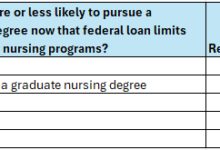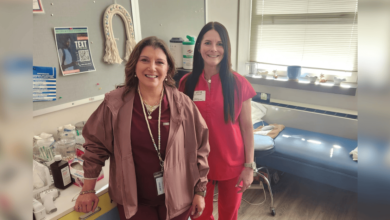From nurse to chief executive: what it takes to reach the top

With what seems like more and more nurses progressing to the very top of NHS leadership, four nurses-turned-chief executives sat down with Nursing Times to share their personal career journeys.
Some have followed a traditional pathway up the ranks, while others have taken different routes. What was common in their advice to other nurses wanting to become chief executives was to never say no to a good opportunity.
Caroline Trevithick

A back injury and an incident of sexism helped set Dr Caroline Trevithick on the path toward leadership.
Qualifying as a nurse in 1990 from Nottingham School of Nursing, Dr Trevithick ended up specialising in infection prevention and control (IPC) early on after “quite a nasty” back injury meant she needed to step away from hands-on nursing.
Around the same time, Dr Trevithick said she was passed over for a promotion to a sister role and was told that the man who got it did so because it was “his turn”.
“There was a bit of sexism going on there,” she noted.
“When I reflect on my career, that is definitely a turning point for me that gave me a bit of an impetus to think differently about career and ambition.”
Dr Trevithick was given the opportunity to set up a community IPC service in Leicestershire and she said this “just opened doors for me in a way that I never, ever dreamed possible”.
Staying in IPC, she then started working for East Midlands Strategic Health Authority and the Department of Health’s Cleaner Hospitals Team and was putting plans in place to tackle “huge” rates of MRSA and C difficile in hospitals.
“I think that that, again, put me in places that I hadn’t necessarily thought I would be in,” Dr Trevithick said.
“I was, all of a sudden, advising the trust board on IPC activities. And working with chief executives at a time when specialist nurses tended to be in the nursing arena only.”
“One of the things that’s important to me is that I still demonstrate that I’m a nurse”
Caroline Trevithick
She then moved into primary care trusts followed by clinical commissioning groups (CCGs) and, in 2020, joined Leicester, Leicestershire and Rutland CCGs as their director of nursing. Later, she also took on the role of deputy chief executive.
In November 2023, she started her current role of interim chief executive of Leicester, Leicestershire and Rutland Integrated Care Board, which replaced the CCGs.
Dr Trevithick said one of the things she had learned during her career was that she could work beyond the boundaries of what may be considered “traditional nursing roles”. 
However, as a chief executive, she said her nursing identity would remain strong.
“Being a nurse isn’t necessarily what’s in the title. Being a nurse is what’s in me and how I demonstrate that through my leadership,” she said.
“One of the things that’s important to me – and that other people have said is important to them – is that I still demonstrate that I’m a nurse, and that I might be chief executive, but I’m a nurse chief executive.”
Planning to remain on the register, Dr Trevithick said she would keep her nursing code and principles in mind when faced with the “difficult decisions” required of a chief executive, for example around finance.
“It helps me be able to demonstrate where I’m not prepared to go as much as where I am prepared to go,” she said.
She encouraged other nurses wanting to progress to “never say no if you’re presented with an opportunity”.
Lorraine Sunduza
 For Lorraine Sunduza, chief executive of East London NHS Foundation Trust, nursing is her “special power”.
For Lorraine Sunduza, chief executive of East London NHS Foundation Trust, nursing is her “special power”.
Ms Sunduza was made substantive chief executive in May 2024, after spending 22 of her 24 years in the NHS at the trust.
Her career began in 2000 when she qualified as a mental health nurse from De Montfort University in Leicester, despite initially being turned down and told to get some experience first.
After qualifying, she had a brief stint at West London NHS Trust before moving to East London and proceeding to spend 13 years working in forensic services.
During this time, she progressed from charge nurse to head of forensic nursing and she said she “absolutely loved it”.
Ms Sunduza was then ready for a change and had completed some leadership training. That was “pivotal in terms of my leadership journey” she said, because “that training really helped me to learn about me and me as a leader”.
She secured a job as director of nursing for mental health services and it was in this role that she realised the importance of representation.
“I remember that was the time for me that people started… talking about what I represent as a possibility, being a director of nursing,” she said.
“And it was a bit daunting, scary, overwhelming as well, but it exposed me to so much across the trust.”
From there, her career flew. In 2018, Ms Sunduza was made chief nurse at the trust and then, a couple of years later, she additionally took on the role of deputy chief executive.
In August 2023, she became the trust’s interim chief executive before then being appointed to the position substantively this year.
“There are days when you catch yourself, when you realise just how big your role is”
Lorraine Sunduza
She said she was very aware of the “enormity” of her role and that, although she no longer has nursing in her job title, she would remain a nurse and plans to stay on the register.
“There are days when you catch yourself, when you realise just how big your role is. And I suppose for me, I rely on my nursing training and expertise because that’s my special power,” she said.
Ms Sunduza believed the breadth of experience that nurses gain in terms of patient care, as well as general healthcare logistics, meant they were well placed for leadership, as well as having many other options.
“I think you get exposed to so many things that, if you go towards them, it moulds you in a way that makes you eligible for quite a lot of pathways in the NHS, actually,” she said.
Her advice to other nurses wanting to become chief executives included using all the opportunities available to them to learn and be stretched, taking sideways career steps if necessary and having “the belief that it can be done”.
Jacqueline Totterdell

Experienced nurse-turned- chief executive Jacqueline Totterdell’s dreams of entering the NHS almost never came to be.
As a youngster in Manchester, Ms Totterdell “flunked” her O Levels. After retaking them and passing, she then failed her A Levels, thwarting her plans to become a physiotherapist.
However, an advertisement in the Manchester Evening News highlighting a shortage of nurses set her back on course.
After completing her training at Sheffield Children’s Hospital and the Royal Hallamshire Hospital, Ms Totterdell qualified as a combined general and children’s nurse in 1986.
She embarked on a career in children’s nursing and, in 1992, was recruited to help open a paediatric intensive care unit at Leeds General Infirmary.
Inspired by the senior leaders at the hospital, Ms Totterdell said she realised that “it wasn’t just about going up the nursing hierarchy” and that “there were other routes I could take if I wanted to grow”.
It was at Leeds that Ms Totterdell took her first step into general management, being tasked with reducing waiting times for dermatology services.
“Nursing has given me a lot of resilience and a love of the NHS”
Jacqueline Totterdell
She then moved to another general manager job at Birmingham Children’s Hospital before joining the NHS Modernisation Agency.
Returning to NHS trusts, Ms Totterdell was a chief operating officer and deputy chief executive before gaining her first chief executive role in 2011, at Southend University Hospital.
Since 2021, she has held her current role of group chief executive of St George’s University Hospitals NHS Foundation Trust and Epsom and St Helier University Hospitals NHS Trust.
Despite being off the nursing register for around 25 years, Ms Totterdell said there were still elements of her nurse experience that she used today. These included emotional intelligence and an understanding of how to communicate with patients, families and clinicians. 
In addition, she said: “I think nursing has given me a lot of resilience… but it’s also just given me a love of the service. I do love the NHS.”
She said she was “pleased” to see clinicians, including nurses, continuing to be appointed to chief executive positions and wanted to see more women in these roles.
In her experience, women “have to work a bit harder” to reach the top, she said.
She noted how she was now one of only three female chief executives in the large NHS teaching hospitals.
“I think there is something about [asking] ‘how do we encourage women to do these big jobs?’, as well as ‘how do we encourage nurses?’,” said Ms Totterdell.
She said development was sometimes about “taking the opportunities as they come, and having faith in yourself”, noting how, in her career, she had not planned every move but, rather, had picked up roles that sounded interesting as they appeared.
Karen Dunderdale
 An unsuccessful interview to join the Metropolitan Police led Professor Karen Dunderdale into a career in nursing.
An unsuccessful interview to join the Metropolitan Police led Professor Karen Dunderdale into a career in nursing.
After being told at 18 that she needed to gain more experience of adult life before being considered for the police, Professor Dunderdale was alerted by her mother to an advert in the newspaper stating that a “local school of nursing requires students”.
She applied, and “to my surprise”, was accepted. Qualifying in 1991, Professor Dunderdale has worked in the NHS ever since and she said she had “loved every minute”.
Professor Dunderdale noted that her route into leadership had not been a traditional one for nurses.
Specialising in cardiology, she gained funding to set up a cardiac rehabilitation service in her hospital.
She then went on to complete a PhD on the topic of health-related quality of life in people with chronic heart failure.
After reaching a “crossroads” in her career, she discussed with the then director of nursing at Northern Lincolnshire and Goole NHS Foundation Trust about a secondment opportunity as the assistant director of nursing.
“What she said to me was, ‘Karen, you influence a lot of people’s lives directly working in cardiology. But in this role as the assistant director of nursing, you could indirectly influence so many more people and [in] so many different ways’,” Professor Dunderdale explained.
She got the job and then continued to climb the ladder at Northern Lincolnshire and Goole. In 2011, she was appointed its chief nurse before progressing to deputy chief executive.
“I think as nurses, we command a high degree of credibility across the NHS”
Karen Dunderdale
After a stint as a senior nurse adviser at NHS Improvement, she was made nursing director and deputy chief executive at Walsall Healthcare NHS Trust, before joining United Lincolnshire Hospitals NHS Trust in the same roles.
In July 2024, she gained her first chief executive job – for Lincolnshire Community and Hospitals NHS Group.
Professor Dunderdale said it was a “huge, huge privilege” to be appointed to the role and was a responsibility she did not take lightly.
As chief executive, she said she saw her nursing status as a benefit. 
“I think, as nurses, we command a high degree of credibility across the NHS,” she said.
Professor Dunderdale is planning to stay on the register, noting: “It’s important to me, but I think it’s also important to colleagues across our organisations that there is a practising clinician who is at the helm.”
Looking back, Professor Dunderdale said achieving her PhD was a “landmark moment” that helped to open up opportunities.
She also said completing the NHS leadership programme for aspiring chief executives “convinced me that, actually, I can do the role of the chief executive”.
Her advice for other hopeful nurse chief executives was: “Follow your heart, don’t back away from that if that’s what you want to do. Find the right people around you who can support you to get there…. and take every opportunity that you can to broaden your understanding.”






